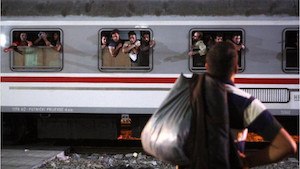A newly released magazine from the Islamic State has called upon sympathizers around the globe to carry out more lone-wolf attacks, specifically mentioning the targeting of innocent civilians on the way to work, children at parks and street vendors. Unfortunately, as Islamic extremism becomes a more popular ideology to follow, preventing vulnerable individuals, who are susceptible to the calling, from performing radical acts is nearly impossible. However, we can improve upon how we prevent Islamic State fighters from being dispatched throughout Europe and America, where they spread their cancer and conduct attacks on innocent civilians. Within the most recent magazine, the Islamic State also boasts that hundreds of individuals are in Europe waiting to strike. The simplest solution to this problem is crushing the Islamic State in Syria and Iraq; something we could have done early on if our current administration supported it, which would have prevented the massive refugee crisis in Iraq and Syria.
Regardless of your stance on the War in Iraq, one aspect that many agree upon is the fact that the U.S. prematurely abandoned country after successfully removing Saddam Hussein from power and reducing the violence from al-Qai’da in Iraq. This in turn created an unstable situation, which former members of al-Qai’da and other extremist groups, were able to capitalize upon, thus spawning the group we now call the Islamic State, or ISIS.
In 2014, ISIS, in an effort to do what no other extremist group of its kind had ever done, began forcibly seizing land throughout Iraq and Syria. The harsh and radical Sharia system of law was put into place and the civilians that could, fled their homes. As the war with ISIS continues, the number of refugees from both Iraq and Syria grows in an unsustainable fashion. Refugee camps are riddled throughout the region providing inadequate and downright depressing accommodations for families who cannot return to their homes. While this is sad, we unfortunately need to focus on the bigger issue that stems from this problem, the mass exodus of refugees from the region through Turkey and ultimately into Europe and beyond. ISIS has capitalized on a problem that they created and now use the migration of refugees as cover to smuggle operatives out of the country and into more desirable locations, from which they can plan and execute attacks.
“ISIS has capitalized on a problem that they created”
A possible reason for the rapid expansion of the refugee crisis, and the threat it creates, is the United States’ unwillingness to provide adequate resources to the fight. While the number of U.S. personnel has increased in Iraq, the primary emphasis has been the use of air strikes to eliminate senior leadership and key installations. These strikes have been effective on numerous occasions, but as most military strategists would tell you, air power alone cannot eliminate the enemy. Still, the ‘air operations and advisor only’ option keeps the current administration’s hands clean and their constituents happy by sticking to their promise of not returning troops to Iraq, a promise that never should have been made. By leaving our special operations forces on the sidelines, we are unable to strike the fear of God into ISIS and subsequently cannot push further into their strongholds. Therefore, because of the aforementioned reasons, ISIS feels less threatened, is given more time to plan both internal and external operations and more people become refugees. As the number of refugees increases and they spread outside of Iraq and Syria, we lose fidelity on their whereabouts, thus making the counterterrorism officials’ jobs near impossible and placing communities around the globe at a higher probability for extremist violence.
While this problem may have grown beyond our ability to fix it, we can certainly slow the bleeding by allowing our men and women to systemically and decisively destroy ISIS in their homeland so that civilians can return to their towns and quell the refugee crisis. We cannot and will not defeat the extremist ideology, but perhaps with a little more devotion and less concern about political repercussions, we can eradicate the largest elements of the problem.
By a Senior OpsLens Contributor

















